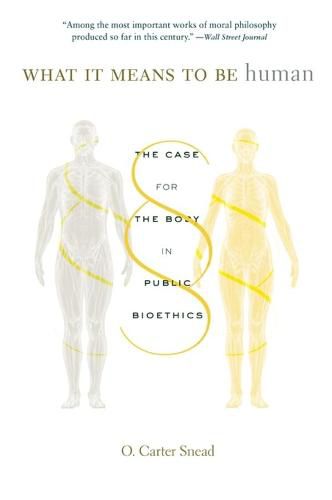Readings Newsletter
Become a Readings Member to make your shopping experience even easier.
Sign in or sign up for free!
You’re not far away from qualifying for FREE standard shipping within Australia
You’ve qualified for FREE standard shipping within Australia
The cart is loading…






A Wall Street Journal Top Ten Book of the Year A First Things Books for Christmas Selection Winner of the Expanded Reason Award
A brilliantly insightful book about how American law has enshrined individual autonomy as the highest moral good Highly thought-provoking.
-Francis Fukuyama, author of Identity
This important work of moral philosophy argues that we are, first and foremost, embodied beings, and that public policy must recognize the limits and gifts that this entails.
-Wall Street Journal
This remarkable and insightful account of contemporary public bioethics and its individualist assumptions is indispensable reading for anyone with bioethical concerns.
-Alasdair MacIntyre, author of After Virtue
The natural limits of the human body make us vulnerable and therefore dependent on others. Yet law and policy concerning biomedical research and the practice of medicine frequently disregard these stubborn facts. What It Means to Be Human makes the case for a new paradigm, one that better reflects the gifts and challenges of being human.
O. Carter Snead proposes a framework for public bioethics rooted in a vision of human identity and flourishing that supports those who are profoundly vulnerable and dependent-children, the disabled, and the elderly. He addresses three complex public matters: abortion, assisted reproductive technology, and end-of-life decisions. Avoiding typical dichotomies of conservative-liberal and secular-religious, Snead recasts debates within his framework of embodiment and dependence. He concludes that if the law is built on premises that reflect our lived experience, it will provide support for the vulnerable, including mothers, families, and the unborn. In this way, policy can ensure that people have the care they need to thrive.
$9.00 standard shipping within Australia
FREE standard shipping within Australia for orders over $100.00
Express & International shipping calculated at checkout
A Wall Street Journal Top Ten Book of the Year A First Things Books for Christmas Selection Winner of the Expanded Reason Award
A brilliantly insightful book about how American law has enshrined individual autonomy as the highest moral good Highly thought-provoking.
-Francis Fukuyama, author of Identity
This important work of moral philosophy argues that we are, first and foremost, embodied beings, and that public policy must recognize the limits and gifts that this entails.
-Wall Street Journal
This remarkable and insightful account of contemporary public bioethics and its individualist assumptions is indispensable reading for anyone with bioethical concerns.
-Alasdair MacIntyre, author of After Virtue
The natural limits of the human body make us vulnerable and therefore dependent on others. Yet law and policy concerning biomedical research and the practice of medicine frequently disregard these stubborn facts. What It Means to Be Human makes the case for a new paradigm, one that better reflects the gifts and challenges of being human.
O. Carter Snead proposes a framework for public bioethics rooted in a vision of human identity and flourishing that supports those who are profoundly vulnerable and dependent-children, the disabled, and the elderly. He addresses three complex public matters: abortion, assisted reproductive technology, and end-of-life decisions. Avoiding typical dichotomies of conservative-liberal and secular-religious, Snead recasts debates within his framework of embodiment and dependence. He concludes that if the law is built on premises that reflect our lived experience, it will provide support for the vulnerable, including mothers, families, and the unborn. In this way, policy can ensure that people have the care they need to thrive.